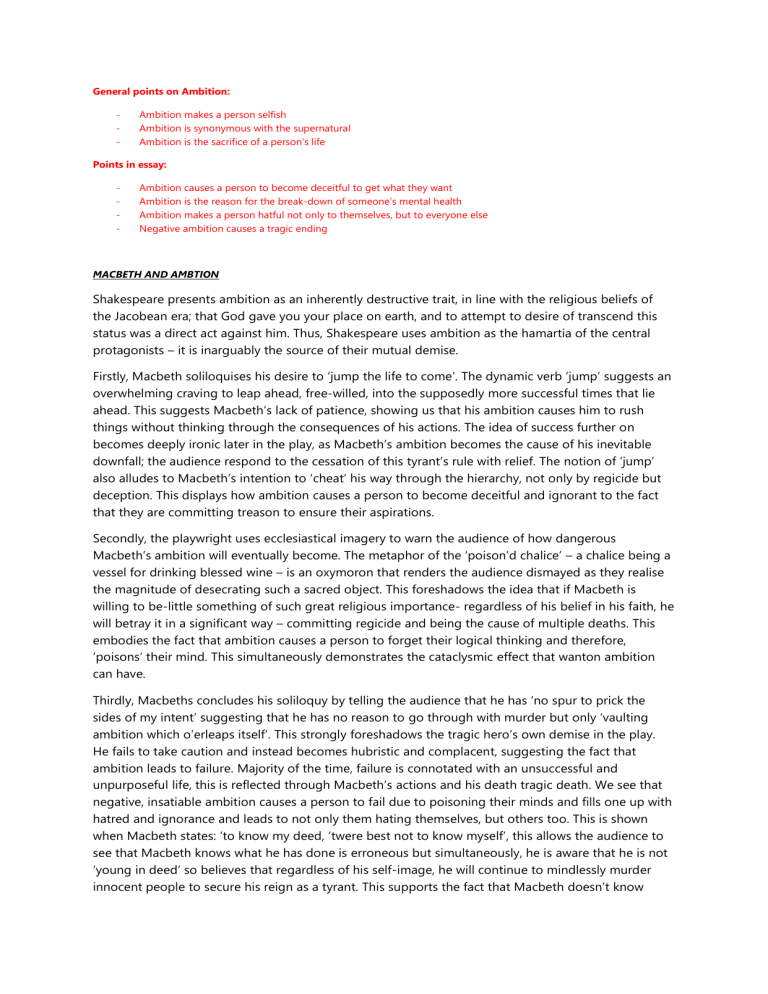
General points on Ambition: - Ambition makes a person selfish Ambition is synonymous with the supernatural Ambition is the sacrifice of a person’s life Points in essay: - Ambition causes a person to become deceitful to get what they want Ambition is the reason for the break-down of someone’s mental health Ambition makes a person hatful not only to themselves, but to everyone else Negative ambition causes a tragic ending MACBETH AND AMBTION Shakespeare presents ambition as an inherently destructive trait, in line with the religious beliefs of the Jacobean era; that God gave you your place on earth, and to attempt to desire of transcend this status was a direct act against him. Thus, Shakespeare uses ambition as the hamartia of the central protagonists – it is inarguably the source of their mutual demise. Firstly, Macbeth soliloquises his desire to ‘jump the life to come’. The dynamic verb ‘jump’ suggests an overwhelming craving to leap ahead, free-willed, into the supposedly more successful times that lie ahead. This suggests Macbeth’s lack of patience, showing us that his ambition causes him to rush things without thinking through the consequences of his actions. The idea of success further on becomes deeply ironic later in the play, as Macbeth’s ambition becomes the cause of his inevitable downfall; the audience respond to the cessation of this tyrant’s rule with relief. The notion of ‘jump’ also alludes to Macbeth’s intention to ‘cheat’ his way through the hierarchy, not only by regicide but deception. This displays how ambition causes a person to become deceitful and ignorant to the fact that they are committing treason to ensure their aspirations. Secondly, the playwright uses ecclesiastical imagery to warn the audience of how dangerous Macbeth’s ambition will eventually become. The metaphor of the ‘poison’d chalice’ – a chalice being a vessel for drinking blessed wine – is an oxymoron that renders the audience dismayed as they realise the magnitude of desecrating such a sacred object. This foreshadows the idea that if Macbeth is willing to be-little something of such great religious importance- regardless of his belief in his faith, he will betray it in a significant way – committing regicide and being the cause of multiple deaths. This embodies the fact that ambition causes a person to forget their logical thinking and therefore, ‘poisons’ their mind. This simultaneously demonstrates the cataclysmic effect that wanton ambition can have. Thirdly, Macbeths concludes his soliloquy by telling the audience that he has ‘no spur to prick the sides of my intent’ suggesting that he has no reason to go through with murder but only ‘vaulting ambition which o’erleaps itself’. This strongly foreshadows the tragic hero’s own demise in the play. He fails to take caution and instead becomes hubristic and complacent, suggesting the fact that ambition leads to failure. Majority of the time, failure is connotated with an unsuccessful and unpurposeful life, this is reflected through Macbeth’s actions and his death tragic death. We see that negative, insatiable ambition causes a person to fail due to poisoning their minds and fills one up with hatred and ignorance and leads to not only them hating themselves, but others too. This is shown when Macbeth states: ‘to know my deed, ‘twere best not to know myself’, this allows the audience to see that Macbeth knows what he has done is erroneous but simultaneously, he is aware that he is not ‘young in deed’ so believes that regardless of his self-image, he will continue to mindlessly murder innocent people to secure his reign as a tyrant. This supports the fact that Macbeth doesn’t know himself as ambition has changed him into someone so hateful that it is pointless to try return to his former self. Additionally, even he attempted to become a better person, his hubris dominates him so much he has ‘forgotten the taste of fears’ and has become a ‘dead butcher’. ‘Butcher’ embodies the fact Macbeth was a mindless killer and it is ironic as he is now the ‘dead’ one, showing the audience Macbeth was hated by everyone due the actions of his unquenchable ambition and ended in the same place as those who he had ‘sent to peace’ juxtaposing the idea that he had instead damned himself to hell by disrupting the divine order.
